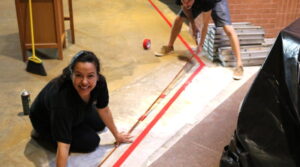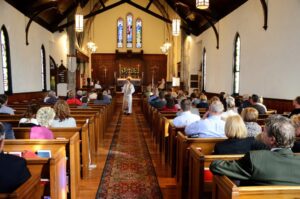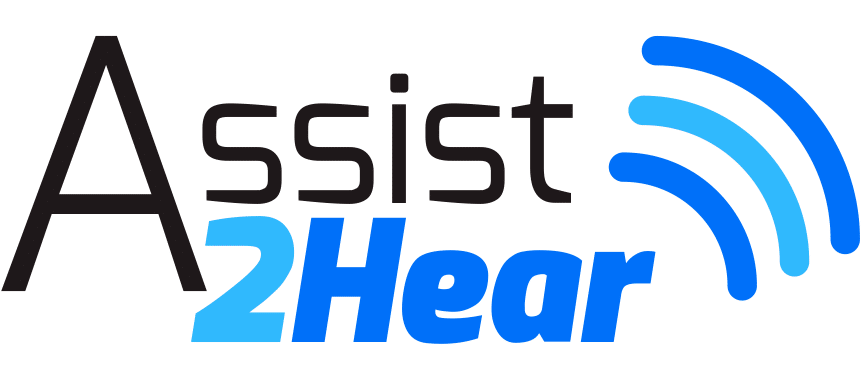Aug 12, 2017 | News, Updates

Ana at the Catholic Church of Saint Mary during the hearing loop installation.
Tulsa Induction Loop Training
On Sunday, August 20th at 9:30 a.m., Ana Covey with Assist2Hear will be at at the beautiful Catholic Church of Saint Mary, 1347 E. 49th Place, Tulsa, Oklahoma, to host an induction loop training session to help parishioners learn to use the church’s new hearing loop system. Tulsans please join us if you have hearing loss and would like to learn more how induction loop systems can help you better hear the Word! Click here to view event information.
Hearing Loops in Churches
Assist2Hear specializes in the design and installation of induction hearing loop systems in churches, performing arts centers, classrooms, and public meeting places such as your local library or city council chambers. To get a free quote for a hearing loop system in your church or just learn more about hearing assistive technology in general, contact Assist2Hear today at info@assist2hear.com.
Aug 7, 2017 | Learning Center, News

Denial about Hearing Loss is very common!
Are you struggling to hear clearly? Do you find yourself asking people to repeat themselves because you believe they are mumbling? Is it difficult to hear in a restaurant or riding in a car? Are you struggling to hear the sermon at church or a speaker during a presentation? Many of us are missing out on important parts of a conversation, constantly trying to fill in the blanks. Are you in denial about hearing loss?
Many of us are in a state of denial about our hearing loss and it is very common. Most hearing loss is very gradual so it can go unnoticed for a long time. We miss the clues and deny the facts. We can’t see or feel hearing loss. Yet, hearing is one of our most important senses. It keeps us connected socially – or not. It is important to our employment, yet we are afraid to say anything for fear of retribution or loss of a job. It is important to our safety and well-being to hear sirens, horns or impending danger.
When did eye glasses become ok but not hearing aids? We’ll spend several thousand dollars to have our eyes fixed with a laser, but we are reluctant to spend the same to improve our hearing. The bad part about denial of your hearing loss is that your brain actually forgets the sounds you used to hear and now do not. The longer this goes on, the harder it is for the brain to relearn these sounds when you are finally fit with a hearing aid. Relate this to your brain adjusting to new bi-focals or tri-focals in your glasses or contacts. It can be unnerving and actually painful when sounds are brought back into your life until the brain adjusts. Some people quit using their hearing aids for this reason! Sure, hearing aids are not perfect and do not “cure” hearing loss any more than glasses cure vision loss, but they are a step toward maintaining quality of life.
With the Baby Boomers making up about 1/3 of the hard of hearing population in the US, hearing loss is becoming more common in conversation. Access for the hard of hearing in many private and public venues is becoming an issue. New revised ADA standards effective 3/15/12 clearly mandate that all public venues of any size with a sound system must provide assistive listening devices. Hearing loops are the favored system by many and loops are becoming more common in the US. Grass roots initiatives are gaining ground in many states including Colorado, Oklahoma, Kansas, Texas, Michigan, Wisconsin, New York, Florida, New Mexico and Arizona.
Advocacy for hearing access is on the rise after being shoved under the carpet for many years. We at Assist2Hear are trying to do our part in promoting access for the hard of hearing and educating the public and hearing professionals about what is available to help the hard of hearing, most notably induction hearing loops.
Are you ready to acknowledge your hearing loss and do something about it? Please visit your local audiologist for a hearing screening and make sure to bring a friend or family member to check theirs as well!
Aug 7, 2017 | Learning Center, News

Caring for your hearing aid is a must! Take care of your investment with these simple tips.
Caring for your hearing aid is essential. Like your car or your home, your hearing aid is an investment and a vital one at that. If you want to make your hearing aid last longer, consider these tips:
1. Did you know that moisture is the # 1 cause for hearing aid failure? Clean and disinfect your hearing aids regularly, but not with water. Spray your hearing aid with a disinfectant/deodorizer that is made especially for hearing aids (including ear molds), then wipe them down with a soft, dry cloth. You can also use hearing aid cleaning wipes, which are pre-moistened. In addition to products that you can use at home, you can also purchase travel-size (2 oz. or 4 oz) bottles of hearing aid spray cleaner or travel-size maintenance kits with battery testers.
2. Remove any ear wax in and around the plastic tubing with a hearing aid brush. Wax can block the receiver or microphone and reduce sound, cause feedback or create a whistling effect. Although many hearing aid kits come with a wire pick, be careful when using them as they can force the wax deeper into the channel.
3. Open the battery door when storing your hearing aid to let the air enter. This will reduce the effects of moisture and helps prolong battery life. Better yet, use a hearing aid dryer. Some hearing aid dryers use gentle heat to remove moisture and condensation. Some use UV light instead of chemicals, to inhibit bacteria growth. Others, like the Ever-Dry Hearing Aid Dryer, use highly absorbent silica gel beads to pull the moisture from the hearing aid and any wax. They’re simple to use and the compartment is easy to open (even for those with arthritis). Most, like the Serene Innovations Hearing Aid Dryer, will hold two pairs of hearing aids or cochlear implant processors. There’s even a built-in battery tester and an AC adapter so you can take the hearing aid dryer when you travel.
4. Keep your hearing aids in their dryer or case when not in use. Don’t store your hearing aid in direct heat or sunlight, which will damage them.
Maintaining your hearing aid can save you a lot of money in the long run. Hearing aid care is surely a “sound” investment in your future!
To learn more about hearing aids and Hearing Loops, visit https://assist2hear.com/treatments-and-devices/
Aug 7, 2017 | Learning Center, News

Now everyone can enjoy entertainment at home with a home hearing loop.
If your family complains that you keep the TV too loud, or you can’t hear your sound system when you leave the room, a home hearing loop can help.
What’s a hearing loop?
A hearing loop, also known as induction loop, is simply a loop of wire plugged into an amplifier that sends a magnetic signal to the t-coil in your hearing aid or cochlear implant. Unlike other wireless hearing technologies like infrared and FM systems, hearing loops don’t need any external receiving units or annoying headsets– simply switch to the telecoil setting in your hearing aid for clear sound.
What’s so great about a residential hearing loop? Everything!
VOLUME: You’ll hear things more clearly and without needing to raise the volume (on the TV or sound system, for example), which can disturb others.
SOUND CLARITY: When the amplifier produces the audible sound that’s relayed back to you, feedback and background noise is eliminated (or greatly reduced)
PRIVACY: Because the loop system works with your existing t-coil hearing aid, you don’t need to “advertise” your hearing loss with a headset.
MOBILITY: Depending on the loop system you choose, you can move from room to room and still get great sound. No need to lug around a belt pack receiver or stay tethered to a stereo with headphones!
What if I don’t have a t-coil hearing aid?
Although most hearing aids in the U.S. are now being made with telecoils, there are options for you if you have an older model that is not equipped with a t-coil (or if you don’t have a hearing aid at all). There are headsets and loop receivers that are compatible with the induction loop to assist those without hearing aids or t-coils.
Can I use my loop system in other places?
In addition to residential loop systems, there are also portable hearing loops for your car or to take when you stay in hotels or visit friends and family. There’s also a growing national hearing loop initiative in which many churches, venues, theaters and public and private businesses (like pharmacies, hospitals, banks and grocery stores) are choosing to install a hearing loop system with raving reviews. To find out about public loop systems in your area, visit HearingLoop.org.
What are you waiting for? Get in the loop!
Already have a hearing loop in your home? Please leave a comment to share how it’s improved your quality of life.
Aug 7, 2017 | Learning Center, News

Hearing Loops for Churches
Hearing loop systems in churches make sure that every word is heard AND understood. One of the major reasons many people get hearing aids is to hear better in church. Unfortunately, large rooms with many hard surfaces like churches are not hearing friendly. Even with the best sound system, reverberation and ambient noise are a huge problem for those with hearing loss and hearing aids.
Helping seniors hear better at church
Hearing loop systems in churches literally brings the sermon straight to the ear of the listener via their hearing aid! The sound is truly nothing short of amazing. One woman in Oklahoma City recently said “It felt as if the minister was sitting right next to me!” And there are no embarrassing headsets to check out- one uses their own hearing aids that are set for their own hearing loss!
Before induction loops, it was common for hearing-impaired parishioners to lose sound quality due to poor acoustics, sound blurring or feedback. Now, churches are paving the way to help the hard of hearing by installing hearing loops. The move isn’t just helping church-goers; it’s bringing back former church-goers who stopped going due to hearing issues. Why go to church if you have to struggle to hear the Word of God? And no one wants to announce their hearing loss with cumbersome headsets!
The miracle of hearing loops
For those who have not experienced a hearing loop system in a church, a hearing loop (also known as an induction loop) is a wireless device technology that works with telecoil hearing aids (almost all new hearing aids now have telecoils) and all cochlear implants to produce clear sound without feedback or background noise. Consisting of only three parts – an amplifier, microphone and very thin loop wire – hearing loops create a magnetic field that is picked up by any t-coil equipped hearing aid and converted to audible sound.
Unlike infrared and FM wireless hearing technologies, which have limits due to varying frequencies and require a receiver (i.e. a headset or neckloop), induction loops simply need a t-coil hearing aid or a cochlear implant. (Those without t-coils can also use compatible headsets.) Essentially, a hearing loop system helps the hearing aid do its job!
Hearing loops are already improving the lives of the hearing-impaired at home, in major entertainment venues and theaters, in public places (like pharmacies, banks and stores), and perhaps of most significance to many, in church. Please contact us for a free demonstration of a hearing loop system in your church today!
If you have a hearing aid or new cochlear implant, you’ll want to be kept in the loop – the HEARING loop, that is. To learn more about hearing loops for your church, visit Service: Hearing loops for Churches.
Have you experienced a hearing loop system in church? If so, please share with us how it has improved your ability to hear the Word during worship!





